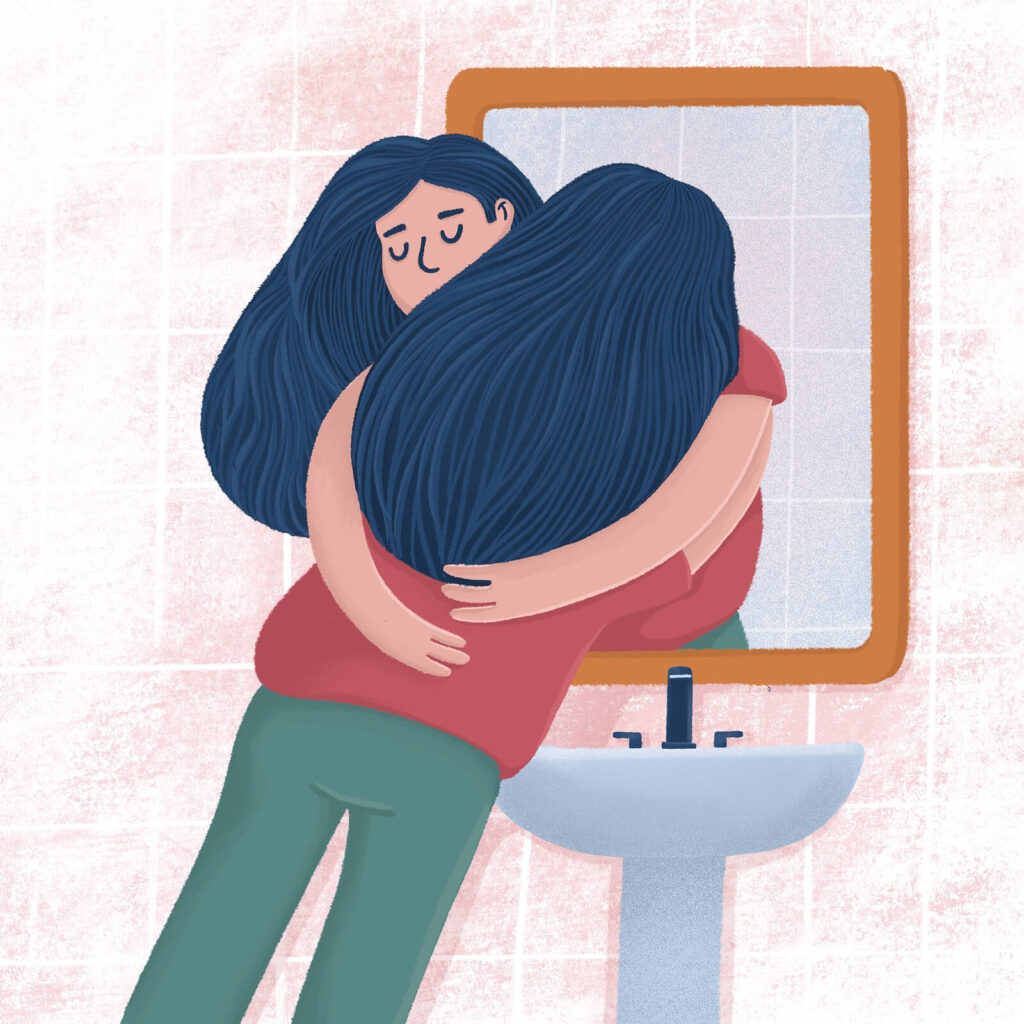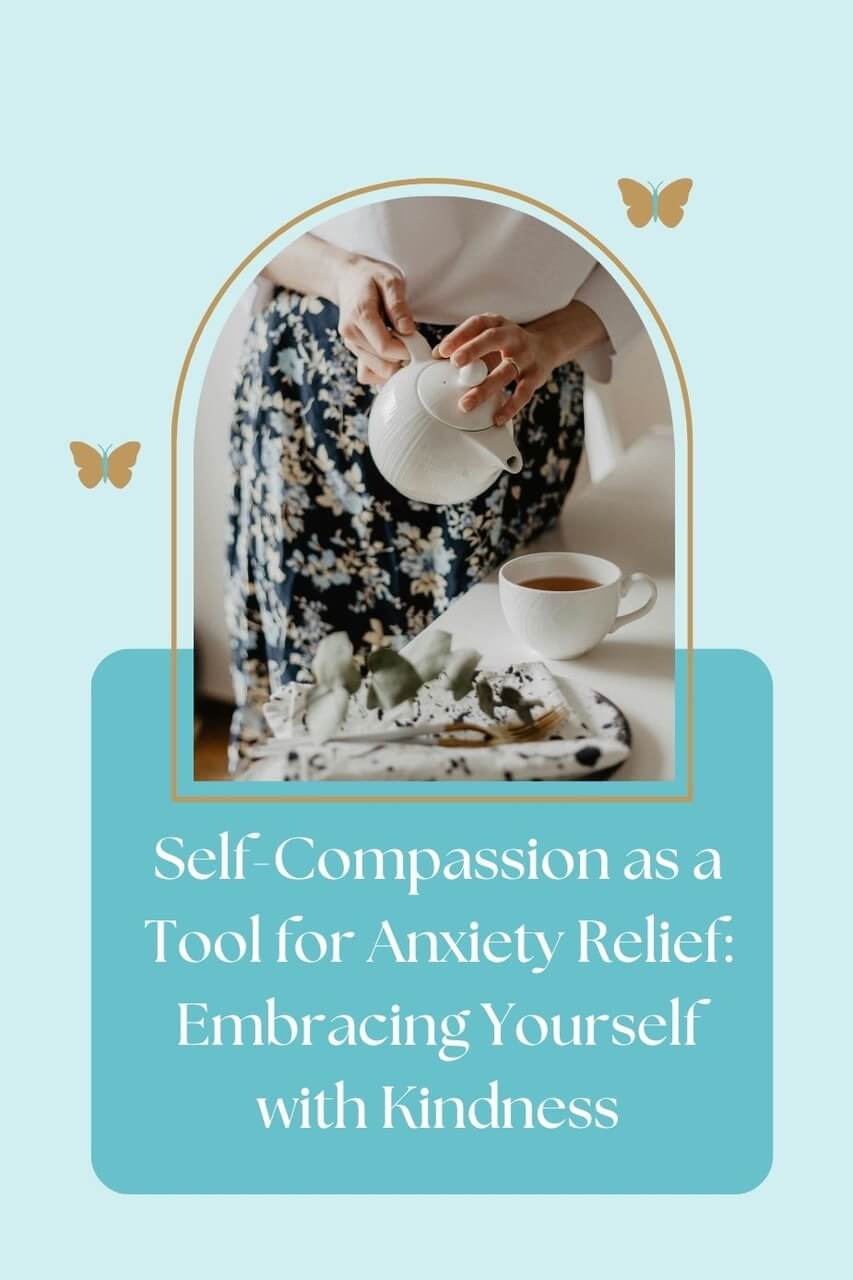What is Self-Compassion?
Self-compassion is the practice of treating yourself with the same kindness, understanding, and support that you would offer to a close friend. Dr. Kristen Neff, a leading researcher in self-compassion, has dedicated her career to understanding how being kinder to ourselves can impact our anxiety, mental health, and well-being. She explains that self-compassion involves three key components:

1. Self-Kindness: Being Gentle with Yourself
Dr. Neff describes self-kindness as offering yourself warmth and understanding instead of harsh judgment when you face difficulties or make mistakes. For example, if you’re feeling anxious about a big presentation, self-kindness means recognizing that anxiety is a normal reaction rather than criticizing yourself for feeling that way.
2. Common Humanity: You’re Not Alone
Common humanity reminds us that everyone experiences difficulties, stress, and feelings of anxiety. It helps you see that your difficulties are part of a shared human experience, which can make you feel less isolated and more connected to others. Rather than feeling like you’re the only one who has anxiety, you begin to understand that it’s a universal experience.
3. Mindfulness: Acknowledging What You Feel
Mindfulness involves being aware of your thoughts and feelings without getting caught up in them or letting them overwhelm you. It means accepting your emotions as they are, without trying to suppress them or becoming overly attached to them. When you practice mindfulness, you create space to feel your emotions without judgment, which can help reduce anxiety and promote a sense of calm. This balance helps you stay present and calm, even in difficult moments.
Through her research, Dr. Neff has found that these three components work together to build emotional resilience and enhance well-being. Practicing self-compassion can lead to reduced levels of anxiety, depression, and stress, while also increasing overall life satisfaction.
Addressing Common Roadblocks to Self-Compassion
Before starting to practice self-compassion, it’s important to address some common misconceptions that can get in the way. Many people fear that self-compassion will make them self-centered, lazy, or complacent. These fears often stem from societal beliefs that value “toughness” and push through pain to achieve success or recognition. Dr. Neff’s research has shown that these concerns are unfounded and that self-compassion actually promotes a healthier, more balanced way of being.
In a culture that often values toughness and self-criticism, we’re taught that being hard on ourselves is necessary for success. However, research demonstrates that self-compassion is a much more effective motivator than self-criticism and can reduce procrastination. By being kind to ourselves, we create a supportive environment where we are more likely to take risks, learn from mistakes, and keep moving forward without being paralyzed by fear or self-doubt.
You might have heard sayings like “You can rest when you’re dead!” or read stories about people who claim they overcame challenges through intense discipline and self-criticism. This can make it easy to believe that being hard on ourselves is the only path to success. Practicing self-compassion can lower anxiety and depression and increase overall well-being. It also makes us more likely to feel competent and less likely to isolate ourselves during tough times. By embracing self-compassion, we can build resilience and find healthier ways to navigate the ups and downs of life.
The Myth: Self-Compassion Equals Laziness
Whenever I bring up self-compassion with my clients, one common fear that I hear all the time is that they’re afraid that self-compassion will lead to laziness or a lack of ambition. People often fear that if they’re too kind to themselves, they’ll lose their drive to succeed or become less productive. But the opposite is true. When you treat yourself with compassion, you create a supportive environment for growth and change.
Research shows that people who practice self-compassion are more motivated to reach their goals because they don’t fear failure as much. When we are kind to ourselves, we feel safer to take risks, learn from our mistakes, and try again without being paralyzed by fear or self-doubt. Self-compassion helps reduce the anxiety that often comes with perfectionism and allows us to move forward with more confidence and less stress.
How Self-Compassion Eases Different Types of Anxiety
Self-compassion can be particularly helpful for different types of anxiety, such as social anxiety, medical anxiety, and perfectionism.
1. Social Anxiety: Reducing Self-Criticism
People with social anxiety often struggle with self-criticism, worrying about how they are perceived by others. For those with social anxiety, self-compassion can soften the harsh self-judgment that often accompanies social interactions. Instead of beating yourself up for perceived social mistakes or awkward moments, self-compassion encourages you to recognize that everyone has awkward moments and that it’s okay to be imperfect. By being kinder to yourself, you can reduce the fear of social situations and feel more at ease.
2. Medical Anxiety: Calming the Mind and Body
When we worry excessively about our health, it can lead to a cycle of fear and stress that makes anxiety worse. Medical anxiety, or health anxiety, can lead to constant worry about illness or physical symptoms. Practicing self-compassion can help by encouraging a mindful approach to these worries—acknowledging them without getting caught up in them. Instead of letting fear take over, self-compassion allows you to be gentle with yourself and recognize that it’s normal to have concerns about health. It helps shift the focus from fear to care and calm.
3. Perfectionism: Letting Go of Unrealistic Standards
Research also highlights the role of self-compassion in combating perfectionism, a common source of anxiety. For perfectionists, self-compassion is a powerful tool to counter the constant pressure to meet impossible standards. When we constantly strive for unrealistic standards, we set ourselves up for disappointment and stress. Self-compassion allows us to accept our mistakes and imperfections, understanding that they are a natural part of life. It encourages you to accept that making mistakes is part of being human and that it’s okay not to be perfect all the time. This shift in mindset can reduce anxiety and make room for a more balanced and fulfilling life.

Mindfulness and Anxiety: Being Present with Kindness
Mindfulness is a key component of self-compassion that involves being fully present in the moment, without judgment. For those dealing with anxiety, mindfulness can be a helpful practice because it teaches you to observe your anxious thoughts without reacting to them.
Instead of trying to push away anxious thoughts or becoming entangled in them, mindfulness allows us to notice them and respond with compassion. For example, if you’re feeling anxious about an upcoming event, you might say to yourself, “I’m feeling nervous, and that’s okay. Everyone feels this way sometimes.” This simple acknowledgment can help you feel calmer and more grounded.
Consider asking yourself questions that help you connect with self-compassion. Reflecting on these questions can help you shift towards a more compassionate mindset. Here are some of the questions that I give to my clients:
- Can I be kinder to myself at this moment?
- What would I say to a friend who is feeling this way?
- What are the benefits of being more understanding with myself?
In addition, I’d love for you to include some kind of actions and self-care. Treat yourself with kindness in simple, everyday ways. Take a relaxing bath, put on comfortable clothes, enjoy a favorite meal, or cuddle with a pet (my personal fave!) Engaging in these small acts of self-care can help reinforce the habit of treating yourself with compassion.
Positive Affirmations: Speaking Kindly to Yourself
Using positive affirmations is another way to practice self-compassion. These are simple, kind phrases you can say to yourself when you’re feeling anxious or overwhelmed. Positive affirmations are gentle reminders that you can say to yourself when you are feeling anxious or overwhelmed. Some examples include:
- “I am doing the best I can.”
- “It’s okay to feel this way; everyone struggles sometimes.”
- “I am worthy of love and kindness.”
- “I don’t have to be perfect to be valued.”
Using these affirmations can help you replace self-critical thoughts with supportive, compassionate ones. Thus, easing anxiety and promoting a sense of well-being.
Five Ways to Bring Self-Compassion into Your Life
In his book The Mindful Path to Self-Compassion, Harvard psychologist Christopher Germer outlines five methods to incorporate self-compassion into your daily life. These methods cover physical, mental, emotional, relational, and spiritual approaches. Here’s a detailed look at each approach with some examples of how you can integrate them into your daily life:
1. Physical Methods: Gentle Physical Touch to Comfort Your Body
With physical touch, it can be a powerful way to show yourself kindness. Physical self-care can significantly impact how you feel emotionally. When you’re feeling stressed, notice how your body reacts. Do you tense your shoulders or clench your jaw? Try placing a hand on your heart, rubbing your shoulders gently, or massaging your temples. Taking care of your physical well-being can be a powerful way to practice self-compassion. This might include eating a healthy meal, resting, or engaging in soothing physical activities like taking a walk or giving yourself a gentle massage. Such actions nurture your body and provide comfort. These small acts can help soothe your body and mind, offering comfort during difficult moments.
Here are some examples:
- Eat Healthily: Choose nourishing foods that make you feel good physically and emotionally.
- Rest: Allow yourself time to relax and recover. A good rest can rejuvenate both body and mind.
- Engage in Gentle Movement: Activities like walking, stretching, or yoga can help relieve physical and emotional tension.
- Soothing Touch: Give yourself a gentle massage on areas that hold tension, such as your neck, shoulders, or feet.
These physical practices provide comfort and support, helping you to feel cared for and valued.
2. Mental Methods: Write a Compassionate Letter to Yourself
Writing a letter to yourself can be a powerful exercise in self-compassion. When facing pain or setbacks, such as a job loss or a personal disappointment, write a letter to yourself expressing understanding and support. Acknowledge your feelings without assigning blame and offer yourself kindness and encouragement.
Here’s how to approach it:
- Acknowledge Your Pain: Describe a situation that caused you distress, such as a breakup or a job loss, and recognize your feelings without assigning blame.
- Offer Support: Write words of encouragement and understanding, as if you were writing to a friend in a similar situation.
- Reflect on Growth: Include reflections on how you can learn and grow from the experience.
This method allows you to process emotions and offer yourself kindness and understanding in times of difficulty.
3. Emotional Methods: Give Yourself Encouragement
Consider how you would support a friend going through a tough time and offer yourself the same encouragement. When you encounter challenges, direct compassionate thoughts toward yourself to foster resilience and comfort.
Consider the following:
- Positive Self-Talk: When facing challenges, replace self-critical thoughts with compassionate and supportive ones.
- Affirmations: Use affirmations that remind you of your strengths and worth. For example, “I am doing the best I can,” or “I deserve compassion and understanding.”
- Celebrate Small Wins: Acknowledge and celebrate your progress and achievements, no matter how small.
By focusing on encouragement and positive self-talk, you build a more supportive inner dialogue.
4. Relational Methods: Practice Mindfulness
Mindfulness involves observing your thoughts and emotions without judgment. When you experience negative self-talk or criticism, practice accepting these feelings with compassion. This approach helps you manage emotions without becoming overwhelmed.
Mindfulness helps you stay present with your emotions without being overwhelmed. Here’s how to incorporate mindfulness into your self-compassion practice:
- Observe Without Judgment: Pay attention to your thoughts and feelings as they arise, accepting them without trying to change or suppress them.
- Be Present: When you experience negative emotions, stay present and acknowledge them with a compassionate attitude.
- Mindful Reflection: Take time to reflect on your emotional experiences with curiosity and acceptance.
Mindfulness allows you to manage your emotions more effectively and fosters a compassionate response to yourself.
5. Spiritual Methods: Connect with Your Inner Self
Engage in practices that connect you with a sense of inner peace and understanding. This might include meditation, prayer, or reflective journaling. By fostering a spiritual connection, you can enhance your self-compassion and overall well-being. Spiritual methods can help deepen your self-compassion practice.
Consider these approaches:
- Meditation: Engage in meditation practices that focus on self-compassion and inner peace. This can help you connect with a sense of calm and understanding.
- Reflective Journaling: Write about your experiences and emotions, exploring how you can approach them with compassion and acceptance.
- Prayer or Contemplation: If you have a spiritual or religious practice, use it to seek comfort and understanding, and connect with a sense of higher support or purpose.
These spiritual practices can enhance your sense of connection and support, promoting a deeper sense of self-compassion.

Ready to Start Your Journey to Self-Compassion?
Self-compassion isn’t about ignoring your problems or becoming complacent. It’s about recognizing that you deserve kindness, especially during difficult times. By learning to be gentler with yourself, you can ease anxiety, improve your mental health, and lead a more fulfilling life.
If you’re feeling overwhelmed or struggling to find balance, remember you’re not alone. Reaching out for support with an anxiety therapist can be an important step toward embracing self-compassion. At Marilyn Ashley, LMFT, we’re here to help you develop the tools you need to navigate anxiety and find greater peace in your everyday life. Reach out to begin your journey toward a kinder, more compassionate relationship with yourself.
Navigate Your Anxiety With Anxiety Therapy in Manhattan Beach, CA
Discover the tools to ease your anxiety and cultivate greater self-compassion. Our anxiety therapy empowers you to calm your mind and nurture your well-being. Start your journey toward a more peaceful and fulfilling life with Marilyn Ashley, LMFT. Follow these three simple steps to get started:
- Schedule Your 20-Minute Complimentary Phone Consultation
- Learn More About Me and My Services
- Begin easing your anxiety and cultivate self-compassion!
Additional Services Offered By Marilyn Ashley, LMFT
At my Hermosa Beach, CA practice, holistic Anxiety Therapy is just one of the services I offer to help ease your anxiety symptoms. In addition to helping you cope with anxiety, I specialize in Life Transitions, Trauma, and Couples Therapy. Together at my Hermosa Beach, CA Practice, I work with adult clients from Manhattan Beach, Redondo, Beach, El Segundo, and the rest of the South Bay area, and we work toward embracing your anxiety and using it as a tool for growth and transformation. I also offer online therapy sessions for those located anywhere else in California. By incorporating holistic practices into your daily life, you can support your overall well-being. I’m excited to work with you on your journey towards healing and growth. Together, let’s embrace your anxiety and learn how to thrive, not just survive! Check out my blog for more about holistic healing!

Hi there!! I’m Marilyn. I empower individuals to embrace their true selves, heal holistically and flourish. I provide in-person therapy in Hermosa Beach, California and the greater South Bay area as well as online therapy throughout California, Colorado, Florida, Kansas and South Carolina. Click here to get started.

